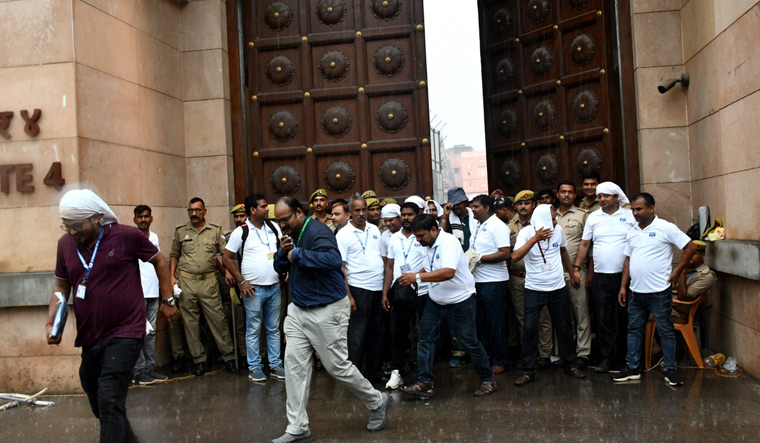As the survey on the Gyanvapi mosque complex conducted by the Archaeological Survey of India (ASI) enters day 3 on Sunday, the Hindu side has claimed that the secondary stage of the survey has begun. The survey began at 8 am and will continue till 5 pm.
"The primary stage has finished and the secondary stage will begin today. Machinery will also be used," Subhash Nandan Chaturvedi, an advocate representing the Hindu side on the Gyanvapi case, told reporters on Sunday.
Another lawyer representing the Hindu side, advocate Vishnu Shankar Jain, added that a detailed study of the western wall was carried out on Saturday. "The grass in the area from the western wall to barricading was removed. The 'tahkhana' was cleaned and the exhaust is being installed. I pointed out a hollow sound beneath the central dome, it is being investigated. An area beside the central dome, which is covered artificially, was also pointed out," Jain told ANI.
The Hindu side added that the Muslim side was cooperating with the survey. Five members from the Muslim side were present on Saturday, after having stayed away on Friday. Advocate Tauheed Khan for the Muslim side too confirmed that two lawyers of the Intezamia Masjid Committee accompanied the survey team.
Intezamia Masjid Committee official Muhammad Yasin has also said that they would cooperate in the survey work, honouring the order of the Supreme Court. "It is hoped that the orders of the honourable court will be impartially complied with, and our mosque will not be damaged. Along with this, our religious rights will remain protected as per previous orders of the court," Yasin said, appealing to people to maintain peace.
Meanwhile, the Hindu side has claimed that fragments of idols were found on Saturday. Advocate Sudhir Tripathi said: "Not idols, but fragments of idols have been found in the debris. We are quite hopeful that idols will also be recovered... The Intezamia Masjid Committee is cooperating... they gave the keys which they were not given earlier."
Use of GPR technology
The ASI is using ground penetrating radar (GPR) technology, which will reportedly help structures buried beneath the mosque.
According to a former additional director general of the ASI B R Mani, GPR technology involves certain types of equipment. "These equipment are kept on the ground and electromagnetic waves or pulses are sent on the sub-surface level below the ground. These pulses come in contact with any anomaly like bricks, sand, stone, and metals and it is recorded on a monitor," said Mani, who is the Director General of the National Museum, told PTI.
He added that experts study it and make the alignment after which they get to know if there is anything solid present beneath the ground. "If this survey (using GPR technology) is done in Gyanvapi, it will be possible to find out if any structure is buried under the mosque and what kind of structure it is," he added.
The scientific survey is being done to determine if the 17th-century mosque was constructed over a pre-existing structure of a Hindu temple.


